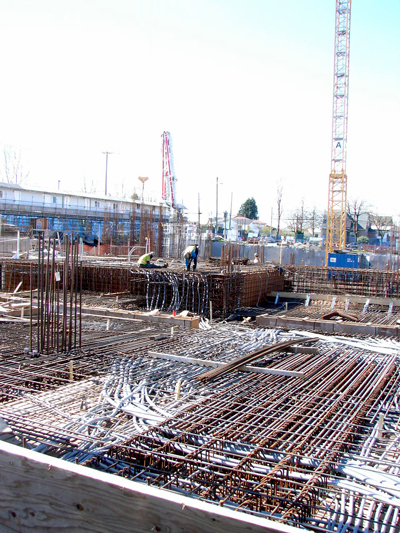The federal government’s proposed countermeasures to the Donald Trump administration’s steel and aluminum tariffs could have a detrimental impact on costs for developers in the residential sector on Canadian soil, says Richard Lyall, president of the Residential Construction Council of Ontario (RESCON).
At the end of May, the U.S. announced plans to impose tariffs on steel and aluminum imports from Canada, consisting of 25 per cent on steel and 10 per cent on aluminum. The Trudeau government responded with countermeasures imposing dollar-for-dollar tariffs on the metals from the U.S. amounting to $16.6 billion.
RESCON sent a letter to the feds June 15 expressing concerns about the retaliatory measures, which would come into effect July 1, asking the government to be mindful of the steel requirements in the housing industry and where it comes from.
“We recognize that you need to respond to the U.S. measures, we’re not arguing with that, but what you really want to do is make sure you don’t impose tariffs or take an action that is just going to hurt us,” stated Lyall, adding any further action could compound current issues with the housing market and have a significant impact on new investment, jobs and the economy.
“We’ve got an enormous amount of housing that we are producing right now and we have a requirement for steel that cannot be met domestically. If we were to impose countervailing measures, it could really jack up the cost of our steel in a major way. This could be the steel that breaks the camel’s back.”
Tariffs could push the cost of construction steel to $2,000 a ton, explained Lyall, which could translate to about $2 million for a developer building a 30-storey condo in Toronto. It could also compromise downstream jobs such as fabricators, distributors, iron workers, carpenters, labourers, concrete producers and other trades.
“The resulting domino effect will cost millions of dollars per average project and could cause project cancellations thus exacerbating existing housing supply and affordability issues,” states the letter.
But Lyall pointed out there are different ways to retaliate.
“One area we would like to retaliate in, is we have steel going to the U.S. that they need, and then all of a sudden their costs have gone up and they depend on our market and we impose tariffs,” said Lyall. “Then it affects them and their companies and, eventually, what should theoretically happen is people will say ‘this is kind of dumb, what we’re doing is raising each other’s costs.’ But if it’s a one-sided story then retaliating in that particular area doesn’t do anything but hurt us. The housing industry doesn’t want to be side swiped by this steel dispute.”
If countermeasures are introduced, particularly with respect to rebar, it will have serious consequences, especially for new condominium developments in large cities across the country and it will not have a reciprocating effect in the U.S., Lyall added. Further trade actions by Canada against non-U.S. foreign rebar suppliers will jeopardize both availability of supply and the corresponding economic viability of many construction projects in Canada, the letter indicates.
“What we are saying is don’t go to town on this one because, in our view, we’re just going to be hurting ourselves,” he said. “It’s like us putting a massive tariff on the importation of orange juice. We don’t grow oranges, so who pays for that, the consumer and it doesn’t make sense. It’s going to drive up the cost of construction, which is going to drive up the cost of housing and we already have a housing supply problem.”
According to Lyall, the Canadian market has already absorbed a lot of different factors in recent years — interest rates and down payment requirements have changed, building and material costs have increased and there has been a slowdown in getting approvals to build.
RESCON will continue to urge the government to reconsider the countermeasures and put in place measures that have a corresponding benefit for Canadians, Lyall said.
Rebar ramif ications from steel countermeasures could be severe
TORONTO — The Residential Construction Council of Ontario recently sent a letter to the Government of Canada outlining its concerns regarding the countermeasures proposed by the Trudeau government following the announcement that the U.S. would be imposing tariffs on steel and aluminum imports from Canada.

One of the major concerns is the proposed tariffs on rebar, which could have significant financial implications for the residential construction industry as it is widely used to build condo towers across Canada.
According to the letter, the vulnerability of rebar users in Canada is based on the following:
- For decades, domestic production has represented 50 to 60 per cent of total domestic consumption of rebar;
- The U.S. is Canada’s largest source of foreign rebar which represents 25 to 30 per cent of the Canadian market;
- U.S. producers are now focused on supplying their domestic market resulting in significantly reduced shipments to Canada and corresponding increased costs;
- Rebar production is in Central Canada and it is uneconomical for those producers to ship to users west of Ontario or east of Quebec due to high transportation costs;
- Rebar often yields the lowest returns and is therefore produced only as a secondary product to other higher value-added products that are produced on the same equipment; and
- Canadian rebar producers face many challenges meeting production schedules; delivery delays of weeks or months to Canadian users are typical, and many Canadian customers are on allocation.











Recent Comments
comments for this post are closed